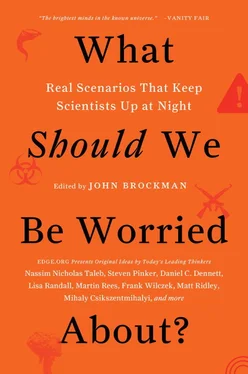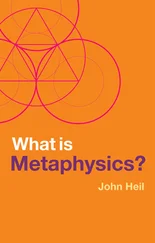Maxwell, James Clerk, 181–82
McEwan, William, 125–26
McLuhan, Marshall, 134
mediasphere, 462
mediologists, 462
meditation, 284
memes, 431
mental health, 83–85, 299–301, 368–69. See also psychiatric disorders
metaworry, 370–72
Metzger, Gustav, 216
Metzinger, Thomas, 440–43
Mexico, 119, 251
Michelson, Albert, 181–82
Michelson-Morley experiment, 181–82
microbiome, cancer and, 295–98
Microsoft, 42, 315
Middle Age, 210
Milgram, Stanley, 368
Mill, John Stuart, 105
Miller, Arthur, 110
mindfulness, 284
mining, 35, 69
misplaced worry, 131–33
Mitchell, Tom, 411
Mochizuki, Shinichi, 388
modern passion of worrying, 475–76
molecular control mechanisms, 24–25
money laundering, 244
“monsters from the id,” 147–49
Montaigne, Michel de, 113
MOOCs (Massive Online Open Courses), 385–86, 390–93
Moore, G. E., 103
moralistic punishment, 104
morbid anxiety, 373–75
Morley, Albert, 181–82
Mormonism, 60, 62, 65
Morozov, Evgeny, 53–55
Morrison, Jim, 156
Motion Picture Association of America (MPAA), 49
MRSA (methicillin-resistant Staphylococcus aureus ), 201
Mueller, John, 3
multitasking, 46
music, catharsis in, 206–7
Musk, Elon, 68–69
Mutually Assured Destruction (MAD), 6–8
mystery of worry, 135–38
nanotechnology, 301, 448–49
narcissism, 3–4, 269–71, 278–79
National Academy of Sciences, 19
National Cancer Institute, 286–88
National Institutes of Health (NIH), 288, 297
nationalism, 235–36
National Review Online , 401
National Survey of Children’s Health, 420
naturalistic fallacy, 103–6
natural selection, 101, 103–4, 121–22, 128, 129, 138, 213, 229–32, 343–46
Naughton, John, 98–99
Neanderthals, 61, 80
negative specific heat, 160–61
Nesse, Randolph, 19–21, 101
networks, 12, 41–44. See also social media
Neumann, John von, 267
neurometrics, 284, 406–9
neuromodulation, 262–64
neurophenomenological state-classes, 442
neuroscience, 26–29, 45–47, 151, 210–12, 218, 262–64, 273–74, 410–14
neurotic versus effective worrying, 212
Newman, John Henry, 62
Newton, Isaac, 127, 160, 192, 336–39
New York Times , 139–42, 143, 144–45
Nigeria, 63–64
Nixon, Richard M., 286, 303
Nobel Prize, 35–36, 257, 282
noninvasive neuromodulation, 262–64
normal bell curve, 468–69, 472
North Korea, 384
Norton, Michael I., 143–45
Nørretranders, Tor, 121–22
nuclear fuel, 36, 70
nuclear weapons, 2–3, 6–13
Obama, Barack, 100, 172, 315
objective/subjective assymetry, 127–30
Obrist, Ulrich, 214–17
obscene words, 48–49
observation, importance of, 325–27
obsession, with impact of worrying, 328–31
O’Donnell, James J., 475–76
oil spills, 35
Olympic Games, 272, 284
Oneal, John, 105–6
O’Neill, Brian, 237
100-Year Starship (100YSS), 355–57
open platforms, 342, 408, 461
Oppenheimer, J. Robert, 267
optogenetics, 301
Orbital Technologies, 69
O’Reilly, Tim, 58–59
outsourcing, 306–9, 396
Overbye, Dennis, 139
packaging worry, 456–57
Pakistan, 2
pandemics, 79, 308–9
Paralympics, 275
parasites, 298, 432
parents, 31, 379–82
Parker, Bruce, 246–49
Parkinson’s disease, 301
passback, 93
pathological synchrony, 79, 82
patience deficit, 41–44
PayPal, 68
Penn, Sean, 91–92
Pentecostalism, 207
perfect justice, war and, 4
pharmaceuticals, 37, 83–85, 288, 300–301, 302–5, 333, 375, 377–78, 440–43
phatic speech, 86
phenethylamine, 441
phenotechnology, 442
phobias, 370
physiological needs, 277, 278
Pickover, Clifford, 387–89
pi-meson, 356–57
Pinker, Steven, 1–5, 106, 279, 418, 434, 436–37
Pitt, Brad, 156
Pizarro, David, 56–57
placebo effect, 213
Planck, Max, 149
Planetary Resources, 69
Plato, 391
pleasure of agency (Wood), 360
poetry, 463
Poisson probabilities model, 469–70
Polchinski, Joseph, 183
politics, 158, 242–44, 250–53, 260, 315, 369, 421–23, 453. See also liberal democracy
Polity Project, 105
polygamy, 238–39
polygyny, 238–39
Polymath Project, 273
Popper, Karl, 198
Popular Culture (Fourth Culture), 246–49
population
aging. See aging population
decline in, 117–20
growth of, 68, 114–16
immigration trends, 119–20, 124, 235, 236, 244
portage cities, 444–45
Posner, Richard, 236–37
posthumanism, 352–54
Poundstone, William, 77
poverty, 108, 381
power, 277–79, 315–18, 379
PowerPoint, 88
powersats, 75–76
presentation technologies, 385–86
present-ism, 91–92, 427–30
press. See Internet; journalism
printing press, 46
prisons, 259–60, 437
privacy, 132, 284, 406–9
probability models, 468–72
Protestantism, 65
Provine, Robert, 477–78
Prozac, 83
psychiatric disorders, 83–85, 219, 292, 293, 299–301, 410
PTSD, 284, 374
Putin, Vladimir, 5
p values, 464–65
quantum mechanics, 174–80, 182–87, 191–94, 195, 273, 339
quantum theory, 177
quarks, 189–90. See also Standard Model
Quarter of a Second Rule, 42
queueing theory, 469–70
radiation, 72–76, 293–94
radio, 46, 48–49, 72–76
railroads, 69
Randall, Lisa, 174–76
Rawls, John, 105
Raza, Azra, 295–98
reciprocal altruism, 104
reductionism, in physics, 339
Rees, Martin, 9–13, 215–16
Regis, Ed, 355–57
regulatory capture, 35–36
relationships, 150–57, 323
relativity, 74, 177, 181–82, 184–85, 195
religious institutions, 15, 58, 60–66, 81
reproductive biotechnology, 23, 118–22
Research Excellence Framework (REF), 329
resource shortages, 1–2, 9, 69, 75–76, 115–16, 308–9
respect, 153
retirement age, 235
retroviruses, 297
Richardson, W. Mark, 389
Richter, Gerhard, 217
Ridley, Matt, 65–66
Rindermann, Heiner, 345–46
Robinson, Kim Stanley, 69
robots, 59, 123–24, 132–33, 236. See also artificial intelligence (AI); Singularity, The
Rogers Commission, 268
Roman Empire, 58, 65, 81, 247, 258
romantic love, 150–57, 273–74
Rosenathan, David, 83–84
Rosenberg, Robin S., 362–63
Rovelli, Carlo, 198–99
Rowan, David, 171–73
Royal Society, 394
Rushkoff, Douglas, 376–78
Russett, Bruce, 105–6
Russia, 118, 119
Sabbagh, Karl, 368–69
Saffo, Paul, 50–52
Sagan, Carl, 67–68, 70, 73
Salcedo-Albarán, Eduardo, 250–53
Sampson, Scott, 312–14
Samuelson, Paul, 149
Sanger, Larry, 401–2
Sapolsky, Robert, 218–22, 235–36
SARS, 201
SceneTap, 452–53
Schank, Roger, 458–60
Schiller, Friedrich, 206–7
schizophrenia, 84, 85, 219, 292, 293, 299–301, 410
Schmidt, Gavin, 347–48
Schneier, Bruce, 315–18
Schrödinger, Erwin, 193, 337, 415
Schwartz, Peter, 436–37
science. See also specific subjects and scientific fields
Age of Anxiety, 403–4
alternative institutions, 268
big business and, 37, 287–88, 394–95
Читать дальше












